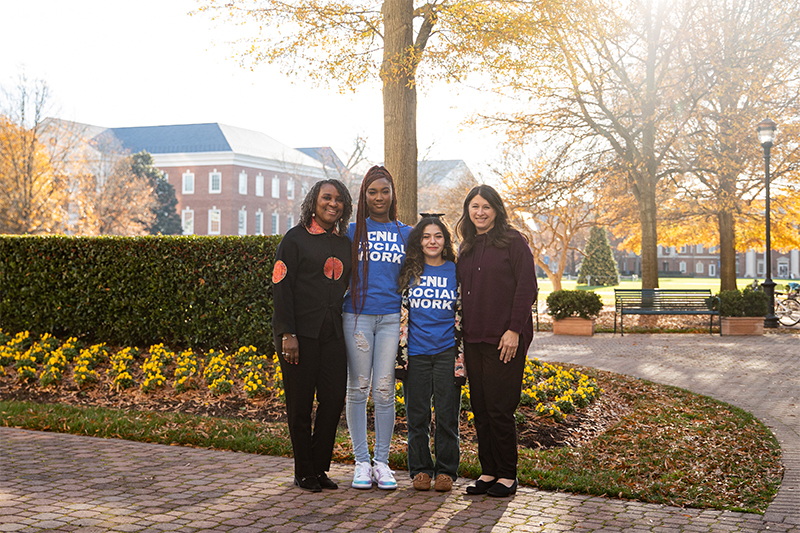
Read time:
Kaylyn Rivera knows first hand how important social workers are to the health of families and the community.
Growing up, a social worker helped her family navigate a mental health issue. The experience made such a positive impact on her that she decided not only to enter the field, but undertake a timely mission to help convince more young people to follow suit.
By 2030, it is expected that there will be a shortage of almost 200,000 social workers in the United States. To help bridge that gap, Rivera and her classmate, Chervern Kirnon, have launched an initiative called the Social Work Engagement and Education Team (SWEET). The project’s goal is to entice high school students from diverse backgrounds to look into pursuing social work as a career path, and more specifically, to do so at CNU.
With the mentoring of Dr. Diane Griffiths, director of Christopher Newport’s Social Work Program, and Michelle Simpson, youth development manager with Alternatives, a community service based organization in Hampton Roads, Rivera and Kirnon created a presentation they show to groups of young people in the community. They answer a variety of questions about social work, the education it requires, the variety of jobs it fosters, and the salary range of the profession.
In an effort to bring diversity to a field that often lacks it, and to the CNU campus, the students have focused their efforts on teenagers of color, first generation, military affiliated, LGBQ+, and men.
“SWEET is imperative to the CNU community in terms of increasing diversity on campus,” said Rivera, ‘24 Social Work. “Our focus on the targeted groups in the community will allow us to raise awareness among teens in the community about the programs CNU has to offer and demonstrate CNU’s commitment to diversity and inclusion. We hope our efforts will result in a more inclusive pipeline of social workers from the local community.”
Griffiths said bringing diversity to the field and to campus is important.
“Diversity, equity, and inclusion are finally at the center of social work education and practice,” she said. “CNU’s social work program, through initiatives like SWEET, embraces this re-centering because we understand that more diversity brings new perspectives, strengthening our capacity to educate students who will be the foundation of communities in Hampton Roads and beyond.”
The SWEET effort is funded by a Faculty Development Grant, which was awarded by the Faculty Senate.
By the end of spring semester, the students will have conducted between 12 and 16 visits with community organizations. The students’ presentation outlines what social work is, how it helps a community, and what it takes to become a social worker. They also want to educate potential students about the broad scope of the field.
“I hope SWEET’s message shows that you can be a good social worker, as there are negative stereotypes around the career,” Kirnon said. “Also that social work has many aspects other than Child Protective Services.”
As for Kirnon and Rivera, both students knew early on that they wanted to study social work. They attended Virginia Peninsula Community College, where they earned their associate degree before transferring to Christopher Newport. Both students believe they have found their calling, and plan to pursue their master of social work after graduating.
“SWEET has allowed me to see a person in myself I never knew was there. I am an introvert and that was one of the reasons I was skeptical about becoming a social worker, as you have to talk to people and put yourself out there,” said Kirnon, ‘24 Social Work. “It helped me to realize how deep I want to go into social work and get my social work license in the future. It allows me to really see myself as a social worker, and I can’t wait to get out in the field.”
Rivera is hoping to positively impact people just like the social worker did for her as a child. She knows firsthand the stability, resources and kindness a social worker can bring to situations. Rivera is interested in working in therapeutic and advocacy-related services.
“I would like to help people in a similar way, where if they do not know how or who to reach out to for help, I can help to bridge that gap,” she said.